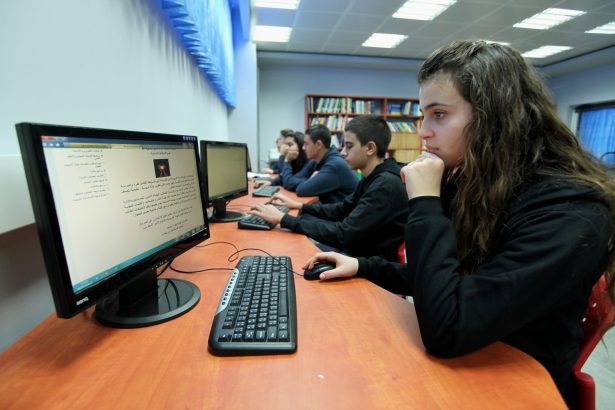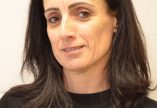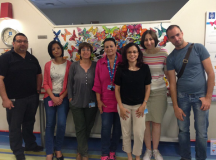Reem Younis is co-founder of Nazareth-based Alpha Omega, a global high-tech company that seeks to further high-tech skills, employment and entrepreneurship among Israel’s Arab citizens. Sam Nurding is assistant editor of Fathom. They spoke on 5th September 2016.
Samuel Nurding: Reem, you have become something of role model for Israeli Arab entrepreneurs, and you now work to nurture other entrepreneurs. You grew up in Israel and studied engineering. What motivated you to pursue a career in the high-tech sector?
Reem Younis: Going to the Technion was not a coincidence, since my Physics and Math teacher at high school used to take us to the Technion and Wiezman Institutes instead of field trips! As soon as I graduated from High-school, I applied only for the Technion, and studied civil engineering there. I didn’t know that I would end up in the high-tech community. That happened after I met my husband, Imad Younis, at the Technion. He studied electrical engineering with the dream of joining the booming high-tech sector in Israel, but when he graduated he was not able to find a job. Most of the high-tech in Israel in the 1980s was dominated by security and military needs, and Palestinians / Arab citizens of Israel were unable to join that sector.
So he decided to go to the US to look for a job, but returned shortly after with one idea in his head, to start up high-tech in Nazareth in order to be able to supply jobs for graduates of the Technicon. After some years working as engineers living in Haifa, we decided that the time has come to fulfil this dream, so in 1990 we both resigned from our jobs, moved to Nazareth with a one month old baby girl and started two companies – Alpha Omega & Alpha CAD.
SN: The high tech sector has exploded in Israel over the last decade and Israel has earned the status as a ‘start-up nation’; a hub of innovation and new thinking. There are in the region of 100,000 plus software developers, but the Arab minority only account for about two per cent. How difficult was it for you and Imad to get into this sector and what kind of barriers did you encounter?
RY: When we started our project we didn’t know what we were getting into. We didn’t have any people to network with and we were disconnected from the centre of action. So determined were we to make this idea succeed that we did not think about raising money and accelerating our growth. We made so many mistakes, but kept going – our urge to succeed has been the reason for our success.
One of the barriers we faced, and still exists today, is that being in Nazareth or in the periphery you are far away from the high-tech centre of Tel Aviv. There is little scope for networking, getting to know the people who work in your field, getting to know the venture capitalists who can invest resources in your company in order for it to grow. In fact, the only person we knew when we began our company was the head of the Chief Scientist’s Office, and we knew he could help invest in our development for new products.
SN: Is the situation different now – are there more resources for investment for Arab start-ups?
RY: Yes. Things are very different. The first change to note is that the majority of the high-tech business is no longer related to security, so Arabs have been able to join these companies and gain experience. They can gain the skillset they need in their new ventures.
To keep Israel as innovative as it is, within the coming 10 years we must make good a shortfall of 10,000 engineers, so the government is investing in the Arab & Haredi schools, encouraging young people to study STEM subjects (Science, Technology, Education, Maths) and eventually be engineers. The chief scientist also has a special program for the Arab start-ups where he subsidises up to 85 per cent of the R&D expenses. We’re also seeing a huge change in civil society. NGOs are starting to help graduates entre the Israeli job market and gain expertise. We are witnessing some start-ups in the Arab community, which is encouraging, and also we are starting to see venture capitalists starting to invest in Arab start-ups.
SN: Arabs have traditionally taken ‘safer’ routes of employment in Israel, such as pharmacy and teaching. Arab education is, to a certain degree, reflective of that. Start-ups are often viewed as riskier. Why do you think Arabs have traditionally preferred employment in pharmacies over start-ups? And are there cultural and educational challenges for Arabs who want to get into high-tech in Israel?
RY: If you look at the Arab community we certainly suffer from having many more pharmacists, lawyers and accountants than we need. But the younger generation are starting to realise that it’s not enough to just gain an academic degree – you need to think about employment afterwards. And the jobs now are in the high-tech sector. Therefore, I’m starting to see more and more young people asking, ‘Where will I work after I graduate, and will my degree help me obtain that job?’ So, yes, the labour market is pushing young people to reconsider what to study, but we are also seeing successful Arab engineers, role models working for big high-tech companies like IBM, Apple and Intel, and they encourage others to follow in their footsteps. The trend is changing, but not at the pace needed for Arab graduates.
SN: So let’s talk about your company, Alpha Omega. What initiatives you are involved in and what is the company’s approach to helping other Arab start-ups?
RY: The idea of Alpha Omega is to change the eco-system of Nazareth and the periphery and to help grow or attract other high-tech companies to the area. We focus on the three E’s – education, employment and entrepreneurship.
We need to invest in education. Many of our engineers / employees visit schools to encourage the next generation to study technology and to help them to dream a bigger dream, bigger than what the system seems to allow. Myself and my husband sit on the board of a few committees that help graduates during their studies like the Technion, Ort Braude and Yafo Tel Aviv collage.
We need to invest in employment. Alpha Omega is one of the few companies that accept engineers without any or necessary experience. Instead, we take the responsibility of giving them the experience so whenever they decide to leave Alpha Omega they are able to gain another job. I also sit on the boards of Kav Mashve and Collective Impact (see Fathom Summer 2015), organisations that promote Arab academic employment in the Israeli companies.
Finally, we need to invest more in Arab entrepreneurship. Already four people from Alpha Omega left to start their own start-up company and now we work with them as our subcontractors because they need business to succeed. Also we invested a little money in an Arab venture capital fund named ‘Takwin’ that aims to help new Arab start-ups.
SN: You want to take high-tech from the urban centres like Tel Aviv, which is dominated by Israeli-Jews, to the periphery and rural areas, where the Arabs are. Do you think the government is doing enough to facilitate this shift? And if not, what more can and should be done?
RY: Is not only because high-tech is mainly in the urban areas that it is dominated by the Jewish population. Most Arabs live in the periphery north and south and in order to get to Tel Aviv is about two hours drive each way. We lack the infrastructure to be able to live in the periphery and work in the centre. For example, there is no direct train from any Arab city or village to Tel Aviv. Therefore you have to relocate and live in Tel Aviv, which is hard for Arabs as they prefer to live with or close to their families. We have an abundance of talented people in the peripheries who are unable to work and therefore the state is not taking advantage of them. And this is why we need to think about moving high-tech from the centre to the periphery.
SN: How do you see the future of Arab entrepreneurship in the Israeli high-tech industry? Will structural challenges persist and force Arabs to relocate abroad?
RY: Obviously, if these issues are not resolved then we, as in Israel, will lose the talent to abroad. If you look people like Apple’s Vice President Johnny Srouji, he used to live in Haifa, but we lost him; he went abroad. To keep our talent here, the three pillars of Israel’s society – the government, the NGO sector and the private sector – need to start working together, invest more in our younger generation, and believe that they can be successful. This would be a win-win situation for both the Arab and the Jewish communities and will bring us a better country with a higher GDP, more products to export and more prosperity for all.
SN: Reem, thanks for speaking with me today and I wish you and Alpha Omega all the best in the future.
RY: Thanks.




































Comments are closed.